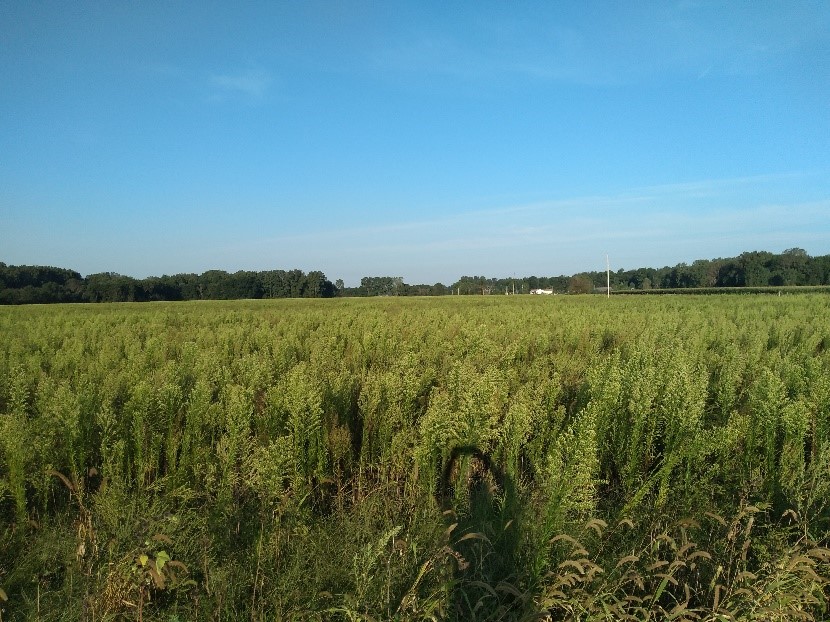Managing multiple resistant pests in soybean fields
Rapidly spreading marestail and soybean cyst nematode and sudden death syndrome problems are merging in some areas, limiting varietal selection options when looking for herbicide-resistant Peking varieties that deal with these pests.

Glyphosate and ALS-resistant marestail is a weed that an increasing number of southern Michigan growers are having to manage. Soybean cyst nematode and sudden death syndrome are also on the rise around the region. We have seen several fields across lower Michigan that now have both problems in the same field. Michigan State University Extension field crops pathologist Martin Chilvers and MSU soybean breeder Dechun Wang have been conducting sudden death syndrome research in southwest Michigan at a location near Decatur for several years. One of their more consistent findings has been varieties that include the Peking source of soybean cyst nematode resistance in general (but not always) have been better suited to withstand the damage caused by soybean cyst nematode and sudden death syndrome than PI88788 or susceptible soybean varieties (see “SCN Population Effects on SDs and Soybean Yield”).
Several growers and local agri-business professionals have reported that Peking varieties (PI 548402) are beginning to more consistently out-yield PI88788 varieties in southwest Michigan, especially last year. It is unclear if the change is due to improvement of the genetics of the Peking varieties, a change of the most dominate bio-type of soybean cyst nematodes that producers are seeing in their fields to those that are no longer controlled by PI-88788 genetics, or both.
One of the challenges with using Peking soybeans to manage soybean cyst nematodes and sudden death syndrome is that there are far fewer varieties of this type that are either Liberty Link, GT 27 (liberty and glyphosate resistant) or Roundup Ready 2 Xtend (dicamba resistant). This can leave growers with relatively few options when tracking down Peking source varieties with the traits to be able to manage multiple herbicide resistant marestail effectively with a post emergence program. MSU Extension nematologist Marisol Quintanilla shared that the yield advantage from using Peking tends to go away if Peking varieties are used back to back for two years or more. Rotating sources of resistance (finding PI88788 varieties that are highly rated for sudden death syndrome tolerance) in addition of rotation with non-host crops, such as corn or wheat, is the best strategy to maintain high yields and stave off resistance to PI 548402 varieties.

It doesn’t look like the spread of either of these pests are slowing down anytime soon. I anticipate more soybean varieties with Peking resistance will be included in the Liberty Link, GT 27 and Roundup Ready 2 Xtend in seed company variety portfolios in the future. Also, there is a mandatory dicamba or auxin-specific training program requirement for RUP applicators if you want to apply Xtendimax, FeXapan or Engenia on Roundup Ready 2 Xtend soybeans yourself.
In the short term, if you have this situation and are not able to source these varieties, review MSU Extension weed control specialist Christy Sprague’s 2019 fact sheet, “Herbicide-resistant horseweed (marestail) in Michigan.” Aggressive tillage, fall/spring burndown herbicides plus using an effective residual herbicide are some of the key methods outlined to control the weeds
One last parting thought. It is always important to power wash thoroughly any new-to-you piece of equipment, especially tillage or harvest equipment, before it is used in the field. There are some devastating multiple herbicide resistant weeds in portions of the Midwest that we do not yet have in Michigan. Effectively washing your equipment before it is used can help keep things that way.
Field Crops Virtual Breakfast is back for the 2019 growing season
In agriculture, things can change fast. To help growers keep up with weather, pests and crop management issues, the MSU Extension field crops team will again hold free Virtual Breakfast sessions every week during the growing season via Zoom video or phone conference. These virtual meetings will take place every Thursday morning from 7-7:30 a.m. starting April 25 through Sept. 5, 2019.
Participating is easy. Join using your computer or mobile device (audio and visual) following the Zoom link: https://msu.zoom.us/j/552324349. Or, call in from your phone (audio only) by dialing 669-900-6833 and enter meeting ID 552-324-349. To receive a weekly email reminder of the Virtual Breakfast, sign up at http://eepurl.com/gm-PIv. Participants receiving emails can opt in or out at any time.
Follow us on Facebook and Twitter for breaking news: @MSUEFieldCrops.



 Print
Print Email
Email


